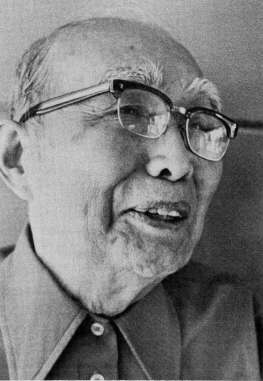the john muir exhibit - people - ryozo azuma by william and maymie kimes - famous people influenced by john muir - john muir exhibit
Ryozo Azuma
1879-1980
Obituary

From The View from John Muir's Window, March, 1980, Issue 26.
The environmental movement was diminished this January 2 [1980] by the death of the great Japanese conservationist, writer and mountaineer, Dr. Ryozo Azuma.
Dr. Azuma died of coronary thrombosis while working on his latest book at his home. He was 91.
It is probably not fair to the memory of a person to suggest a resemblance to another historic figure, but in the case of Ryoza Azuma, he would undoubtedly have considered it an honor to be called "the John Muir of Japan" as there was more than a little resemblance between Azuma and his friend and sponsor, John Muir.
Azuma was born in Central Japan, the son of a Buddhist priest and a strong willed and accomplished mother. While he had strong differences of opinion with his deeply religious father, he retained the deep respect for nature which is one of the benchmarks of the Japanese people.
At age 20, young Azuma went to the Pacific Northwest to attend Puget Sound College at Tacoma. He was to fall in love with this region as John Muir had fallen in love with the California Sierra years earlier.
During the first of his many ascents of Mount Rainier, he spent the night at a shelter called "Camp Muir," the climbing guide who had accompanied Muir to the summit in 1888, told the young Japanese of the famed Scottish American naturalist.
Fascinated, Azuma read all of Muir's books, became his disciple and was able to visit John Muir at the naturalist's Martinez, California home a few months before the old man died in 1914.
The 1914 visit with Muir was the most fateful three days of Azuma's life. Not only did he get his chance to meet his great hero, but Muir, apparently seeing a young image in himself in the Japanese college student, introduced him to an old friend, Captain Hooper. Captain Hooper had commanded the revenue cutter "Corwin" when Muir made his journey on that vessel into the Arctic.
Captain Hooper was scheduled to depart for another expedition to the Arctic above Alaska, but was short a crew man. Without hesitation, Muir said "Take Ryozo" and without hesitation Ryozo Azuma accepted the opportunity.
Thus, Azuma sailed from Martinez into a life of adventure and exploration in the Alaskan and Canadian wilds. He became the foremost Japanese expert on Eskimo life and survival in the Arctic. He climbed more than 140 peaks in the Canadian and American Rockies.
His good humor and understanding of the Western mind made him invaluable as a trade representative for Japan in the New World.
He remained an active supporter of Japanese and American friendship during the Second World War, a stand that required considerable courage as he was by this time an official of the Japanese government.
Like his hero, John Muir, Dr. Azuma was a noted writer. Azuma wrote more than 20 books on subjects as varied as ornithology and American history. In 1973 he published his Life of John Muirr, Father of Nature Conservation.
He was a prominent Christian lay person and was active in church work until the time of his passing.
In his later years, he served as unofficial ambassador of good will between the National Parks and conservation organizations of Japan and the United States.
Conservationists of both nations were calling him "the John Muir of Japan," not only for his conservation efforts but also for the remarkable resemblance in the personal lives of the two great environmentalists.
Dr. Azuma's list of accomplishments is a long one, but the comparison with his friend, John Muir was his most treasured compliment.